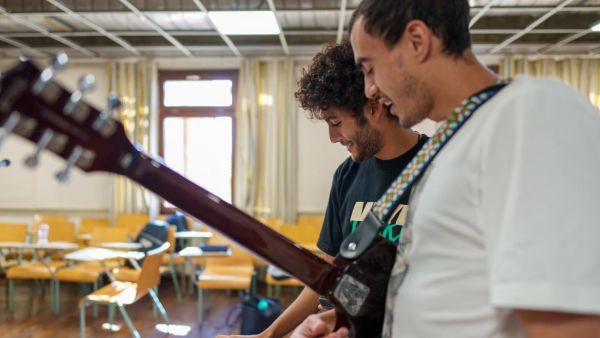AUC Introduces New Academic Programs

The American University in Cairo (AUC) has introduced a series of innovative academic programs, including a new sustainable energy minor, a genomics and biotechnology specialization for biology majors and a restructured music major, as part of its efforts to enrich academic life, promote interdisciplinary learning, and keep pace with global educational and industry trends. These programs are designed to equip students with the knowledge and skills needed for emerging careers across the arts, sciences, and technology.
The Department of Petroleum and Energy Engineering in the School of Sciences and Engineering (SSE) has launched a sustainable energy minor for students interested in sustainability and environmental issues. The minor combines engineering and economics courses to address topics such as sustainable development, energy policy and climate innovation.
“Graduates of the program will be well-prepared for careers in the renewable energy sector, sustainability consulting, environmental policy and energy systems design,” said Abdelaziz Khlaifat, professor and department chair. “The sustainable energy minor is designed to give students a solid foundation in energy systems, renewable technologies and sustainability practices. It offers a pathway for SSE students to be more environmentally conscious and align with industry standards emphasizing sustainability, innovation and systems integration.”
Meanwhile, the Nancy Hopkins Department of Biology has introduced genomics and biotechnology as a new specialization for biology majors, joining existing options in ecology and conservation biology. The specialization offers courses such as Bioinformatics, Molecular Biology of the Gene, Cellular and Molecular Immunology, and Tumor Biology, in addition to the biology core requirements.
“This specialization isn’t just about preparing students for careers in academia or industry,” said Ahmed Moustafa, professor of bioinformatics and genomics data science. “It also aligns directly with Egypt’s national vision and the global shift toward precision medicine. With the Egypt Genome Project underway, there’s a significant investment in genome-centered healthcare that will open new opportunities in research, diagnostics and therapies. Our goal with this program is to ensure that our students are equipped for these opportunities. They will graduate with the knowledge and skills to participate in these advancements and help shape the future of precision medicine in Egypt, across the region and around the world.”
Within the Department of the Arts, AUC’s music program has merged its two former majors — music technology and musical arts in performance into one comprehensive music major.
According to David Rafferty, associate professor of practice and director of the music program, the change makes it easier for students to plan their studies. "Aligning the concentrations and putting them under one roof allows for a much-streamlined format so students can plan a four-year degree,” he said, adding that with the new structure, all music students will take the same foundational courses, such as Arabic and Western Music Theory, before moving on to their chosen areas of specialization. “It's a fresh start that allows us to focus on our strengths — such as Arabic music, jazz, pop and rock — which many of our students are passionate about,” noted Rafferty.
These academic developments reflect AUC’s strategic vision to continually enhance its curriculum, ensuring relevance to the evolving needs of students and the future job market. By bridging disciplines and fostering innovation, AUC continues to set the standard for higher education excellence in the region.
Background Information
American University of Cairo
Founded in 1919, AUC is a leading English-language, American-accredited institution of higher education and center of intellectual, social and cultural life of the Arab world. Its community of students, parents, faculty and staff, trustees, alumni and other generous sponsors represent more than 60 countries. The University stands as a crossroads for the world’s cultures and a vibrant forum for reasoned argument, spirited debate and understanding across the diversity of languages, facilities and human experiences.






